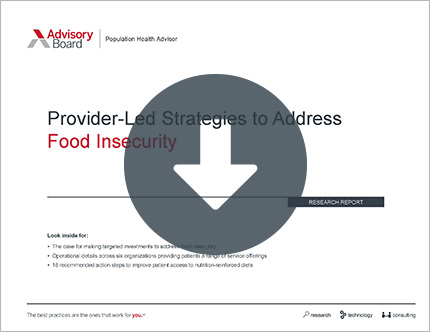Auto logout in seconds.
Continue LogoutSemaglutide, a medication that can help regulate appetite, may lead to a "new era" in anti-obesity treatments after several large-scale clinical trials found it led to significant weight reductions for obese and overweight participants.
Want to help your patients lose weight? 3 reasons why commercial diet programs alone won't cut it.
New anti-obesity medication is a 'game-changer,' some experts say
Semaglutide, a drug made by Novo Nordisk, mimics a hormone called glucagon-like peptide-1 to target areas of the brain that regulate appetite and food intake. The drug has previously been used as a treatment for type 2 diabetes.
To assess its potential use as an anti-obesity treatment, Novo Nordisk funded the Semaglutide Treatment Effect in People with Obesity (STEP) clinical trial program. The STEP program included four phase 3 clinical trials with over 4,500 participants.
In the STEP 1 trial, which was published in the New England Journal of Medicine, researchers at Northwestern University enrolled 1,961 adults at 129 centers in 16 countries. Participants who had existing weight-related conditions, such as diabetes, had BMIs of at least 27. Participants without any conditions had BMIs of at least 30.
Participants were randomly assigned in a 2:1 ratio to either a weekly 2.4 mg injection of semaglutide or a placebo for 68 weeks. All participants also received lifestyle intervention to assist them with their weight-loss efforts.
At the end of the study, participants who received semaglutide lost an average of 14.9% of their body weight, compared to 2.4% in the placebo group. In addition, more than a third of participants lost at least 20% of their body weight, and many participants saw their symptoms of diabetes and pre-diabetes improve.
All four STEP clinical trials produced similar results, Medscape reports, with weight loss for participants receiving semaglutide averaging between 10% and 17%.
In comparison, many currently available anti-obesity medications typically result in a 5% to 9% reduction in body weight. And although semaglutide is not as effective as bariatric surgery, which can lead to a 25% to 30% reduction in weight, many patients may prefer the medication over invasive surgery.
According to Robert Kushner, an obesity researcher at Northwestern University Feinberg School of Medicine, who led the STEP 1 study, semaglutide is a "game-changer" for people with obesity. "This is a start of a new era of effective treatments for obesity," he added.
The future of anti-obesity drugs
In June, FDA approved semaglutide as a treatment for chronic weight management in obese or overweight adults—the first drug approved for such use since 2014. Currently, there are six FDA-approved medications for the long-term treatment of obesity.
"[This] approval offers adults with obesity or overweight a beneficial new treatment option to incorporate into a weight management program," said John Sharretts, deputy director of the division of diabetes, lipid disorders, and obesity in FDA’s Center for Drug Evaluation and Research. "FDA remains committed to facilitating the development and approval of additional safe and effective therapies for adults with obesity or overweight."
In addition, the U.K. Medicines and Healthcare Products Regulatory Agency approved the drug in September, and European Medicines Agency Committee for Medicinal Products for Human Use followed suit in November.
Currently, researchers are assessing combination therapies of semaglutide and other drugs to potentially improve total weight loss reduction, Medscape reports. For example, a 20-week phase 1b study, which was published in The Lancet, found that participants on a combination of semaglutide and the amylin agonist cagrilintide lost 17% of their initial weight. In comparison, participants on semaglutide alone lost only 8% of their initial weight.
"There's hope that, in combination with cagrilintide and probably with several other agents that are still in early development, we'll be seeing average weight loss that is in the range of that seen with bariatric surgery," Kushner said.
Christos Mantzoros of Beth Israel Deaconess Medical Center described obesity as the "epidemic crisis of our time," noting that the disease leads to "serious comorbidities such as diabetes, fatty liver disease, and cardiovascular disease, and significantly shortens a person's length and quality of life." According to FDA, approximately 70% of American adults have obesity or overweight. (Kolata, New York Times, 7/1; Anekwe, Harvard Health Publishing, 9/10; FDA news release, 6/4; Busko, Medscape, 10/27; Tucker, Medscape, 11/16; Wilding et al., New England Journal of Medicine, 3/18; Busko, Medscape, 6/28)

Explore best practice models for implementing programs to address food insecurity, learn from seven provider organizations that represent a broad range of food insecurity interventions, and get action steps for improving patient access to nutrition-reinforced diets.
Don't miss out on the latest Advisory Board insights
Create your free account to access 1 resource, including the latest research and webinars.
Want access without creating an account?
You have 1 free members-only resource remaining this month.
1 free members-only resources remaining
1 free members-only resources remaining
You've reached your limit of free insights
Become a member to access all of Advisory Board's resources, events, and experts
Never miss out on the latest innovative health care content tailored to you.
Benefits include:
You've reached your limit of free insights
Become a member to access all of Advisory Board's resources, events, and experts
Never miss out on the latest innovative health care content tailored to you.
Benefits include:
This content is available through your Curated Research partnership with Advisory Board. Click on ‘view this resource’ to read the full piece
Email ask@advisory.com to learn more
Click on ‘Become a Member’ to learn about the benefits of a Full-Access partnership with Advisory Board
Never miss out on the latest innovative health care content tailored to you.
Benefits Include:
This is for members only. Learn more.
Click on ‘Become a Member’ to learn about the benefits of a Full-Access partnership with Advisory Board
Never miss out on the latest innovative health care content tailored to you.
